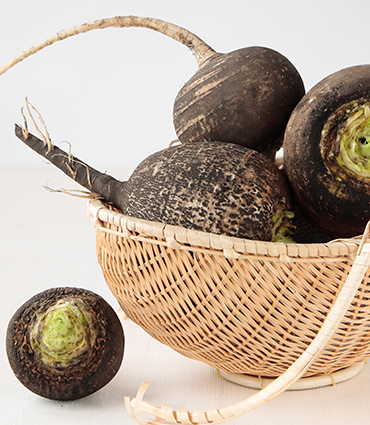
Black Radish

Latin name:
Raphanus sativus var. niger(Mill.) J. Kern
Vernacular name:
Winter Radish - Round black winter radish
Family:
Brassicaceae
Origin:
Asia - Mediterranean Basin
Part used of the plant:
Root
Description
The black radish is a plant of the Brassicaceae family. Its root is used in phytotherapy, but also in various recipes. Black radish has many health benefits, so much so that it was used as a currency in ancient Egypt. Its fame has even led to its representation among the hieroglyphs of the temple of Karnak.
The black radish root is composed of flavonoids, but also of many vitamins, including vitamin A, group B vitamins, including B9, and vitamin C. This root also contains minerals and trace elements (iodine, magnesium, sulphur, zinc, calcium).
Black radish has a detoxifying action on the liver, helping to eliminate xenobiotics from the diet. In addition, this root favors the secretion of bile by the liver (choleretic action) and provokes the emptying of the gall bladder (cholagogue action).
In addition, black radish has digestive virtues and contributes to the proper functioning of the metabolism. It is lipid-lowering, i.e. it contributes to the reduction of cholesterol, and has a gastroprotective effect by stimulating the secretion of mucus. In addition, black radish liquefies mucus and has an expectorant and antitussive activity. It is also anti-infectious (with activity on Helicobacter pylori), antioxidant and anti-inflammatory.
The benefits
- The black radish root is listed in the French Pharmacopoeia.
- Its composition of zinc, calcium, magnesium and phosphorus provides a supply of minerals and trace elements. It is used for its action on the hepato-biliary tracts.
Our products based on Horseradish
-
€27.10
-
€28.30
-
As low as €30.90In stock














Recommandé par mon médecin, je l'utilise régulièrement, avec de tvoir plus
Avis du 28/09/2024, suite à une expérience du 11/09/2024 par Silvia S